- Home
- S. J. Parris
Giordano Bruno 01 - Heresy Page 11
Giordano Bruno 01 - Heresy Read online
Page 11
“Oh, I have been around enough universities to know all about that.” I smiled.
She seemed about to say more, but there was a noise from the direction of the courtyard, where two sturdy men in kitchen aprons approached.
“I had better go,” Sophia said, glancing once more with a fearful expression at the corner where the bodies lay. “I am sorry that I will not be able to attend the disputation, Doctor Bruno. I am not permitted, but I should have liked to see you best my father in a debate.”
I raised an eyebrow in mock surprise, and she smiled sadly.
“No doubt you think that disloyal of me. Perhaps it is—but my father has such fixed ideas about the world, and its ordained order, and everyone’s place in that order, and sometimes I think he believes these things only because he has always believed them and it is less trouble to go on the same way.” She bit anxiously at the knuckle of her thumb. “I would just dearly love to see someone shake his certainties, make him ask himself questions. Maybe if he can accept even the possibility that there might be a different way of ordering the universe, he might learn to see that not everything in that universe has to stay as it has always been. That is why I want you to win, Doctor Bruno.” With these last words she actually gripped my shirt and gave me a little shake. I nodded, smiling.
“You mean that if he can be convinced that the earth goes around the sun, he might also be persuaded that a daughter could study as well as a son, and that she might be allowed to choose her own husband?”
She blushed, and returned the smile. “Something like that. It seems you are as clever as they say, Doctor Bruno.”
“Please, call me Giordano,” I added.
She moved her lips silently, then shook her head. “I cannot say it properly, my tongue gets all tangled. I shall just have to call you Bruno. Win the debate for me, Bruno. You shall be my champion in this joust of minds.” Then she glanced over my shoulder to the bloodstained grass and her smile quickly faded. “Poor Doctor Mercer. I cannot believe it.”
She cast a long look at the mounds of the bodies beneath the trees, her expression unreadable, then turned and ran lightly over the grass toward the college, throwing me a last glance over her shoulder as the burly man who now drew level with me lifted up a capacious sack and said, “Right, matey—where’s this dog wants buryin’ then?”
Chapter 5
Relieved of my last duty of care to poor Roger Mercer by the arrival of the coroner, who came accompanied by the bustling figure of Doctor James Coverdale—the latter hardly bothering to disguise his self-importance in being asked to officiate over the removal of his onetime rival—I left the grove gratefully and hurried through the passageway to the main courtyard. Chapel was over and groups of undergraduates in their billowing gowns stood about in animated discussion, many of them apparently thrilled to be so near to such calamity, even as they pressed hands to their mouths and opened their eyes wide in horror.
It was only just seven o’clock but I felt I had been awake most of the night; I wanted nothing more than to return to my chamber, change my clothes, and try to recoup some of the sleep I lacked before attempting to order my mind in time for the evening’s disputation—an event which held little savour for me now. My shirt and breeches were stained with Mercer’s blood, a fact Coverdale had taken pleasure in pointing out as I took my leave of him and the coroner. “You’d better find some clean clothes, Doctor Bruno,” he had said, with a levity that seemed out of place, “or people will think you the killer!”
I surmised that he was displeased to find me already on the scene and had made an idle joke to puncture any illusion of my usefulness, but as I glanced around the courtyard at the scene of excited consternation, I wondered why he had used the word “killer,” even in jest, if it had been given out officially that Mercer’s death was a tragic accident. Perhaps I was giving undue weight to thoughtless words; in any event, he was right about my clothes, I thought, looking down at my breeches and holding the fabric out to see the extent of the bloodstains. As I did so, I felt something in the pocket and realised that I was still carrying the keys I had taken from Mercer’s body; I must have tucked them away in my own breeches without thinking.
I turned the key ring over in my palm; the smaller key, I guessed, must open the door of Mercer’s chamber, since it was a similar size to the key I had been given for my own guest room. I glanced around the courtyard again. The students were beginning to disperse, books in hand, some toward the staircase that led to the library in the north range, others toward the main gate; no one paid me any attention. I looked at Roger’s key. Might his room not hold some indication of whom he had expected to meet in the garden, I wondered, and why he had taken so much money? I could take a quick look now, while the students were occupied, and return the keys to the rector later, claiming (truthfully) that I had pocketed them inadvertently.
Roger Mercer had mentioned that he lived in the tower room above the main entrance. I glanced up at the tall perpendicular arches of the first-storey windows, presuming this must be the right place, then with a confident step I passed into the shadow of the first staircase on the west range that appeared to lead up into the tower.
Reaching the first landing, I arrived at a low wooden door bearing a painted sign that read DOCTOR R MERCER, SUBRECTOR. After a fleeting glance to either side, I tried the key in the lock. It turned easily, and I slipped quietly into the room Mercer had left only two hours earlier, never imagining he would not return. For a moment I thought I heard light footsteps quickening away overhead; I froze, my ears straining, but I heard no door open or close and there was no further sound.
I had not anticipated the sight that greeted me as I gently pressed the door shut behind me. The room was in turmoil: books, papers, and maps pulled from shelves and flung in every direction with no care for their contents; garments pulled from chests and strewn across the floor. A thick tapestry rug that must have covered the floor was rucked up and pulled to one side, and marks in the dust suggested that someone had tried to prise a floorboard out of place. Either Roger had left in a great hurry after ransacking his room for some lost object or someone else was also searching for something connected with his death and had got here before me.
The room was long with a high ceiling and stretched the width of the range, the narrow leaded windows overlooking the quadrangle on one side and the street outside the college on the other. On the street side was a wide brick fireplace and opposite it, a large oak desk with delicately carved legs. At the far end, facing the door, were three steps leading up to another doorway, which stood open. Sweat prickled on my palms for an instant as I held my breath and listened for any sound other than the frantic pumping of my own blood as I remembered the footsteps I had heard; perhaps they had not come from the storey above, and someone was still in the room. Stepping as carefully as a cat, I grabbed the nearest thing the study offered to a weapon—an iron poker from the grate—and clutched it in both hands along with my courage as I tensed myself to approach the open door. I stepped through, raising the poker—but the small room, inside the tower itself, contained nothing more than a plain truckle bed, a washstand, and a heavy oak wardrobe with carved panels in the doors.
This little bedchamber had not been spared the searcher’s attentions: sheets were roughly torn from the bed, an earthenware jug had been knocked from the washstand and broken in pieces, leaving a damp stain on the rushes that covered the floor. As I drew closer I saw that even the straw mattress had been slashed with a knife, its stuffing spilling out over the bed. In the corner of this square room was a small wooden door set into the wall. I tried the handle but it was firmly locked, though there was a hollow sound when I knocked on the wood; here, I presumed from the echo and the draught that whistled from the cracks, was the staircase to the upper floor of the tower. Gripping the poker, I checked behind the heavy window drapes and under the bed, but found no one. Satisfied that I was alone, I returned to the main room and quietly locked the door
behind me so that I could examine the scene in peace.
Where to begin amid such chaos? The room was crammed with furniture of assorted sizes and shapes, all made from good oak. Chairs had been turned over, a trunk dragged across the floor and forced open to reveal a cache of books. The apparent desperation of the searcher proved beyond any doubt that he believed there was something of significance to be found among Mercer’s possessions; the question was whether it had already been found, and if not, whether I would know it if I saw it.
I turned to the handsome writing desk, now littered with papers and quills. A little brass astrolabe had been knocked to the floor in the frenzy. I bent to retrieve it and set it back on its stand, but its rule was broken. As I crouched I noticed a dark curling object under the desk; its shape was unusual, but when I reached to pick it up and brought it into the light, I saw that it was only a length of orange peel, long dried out, and threw it back to the floor. Lifting one or two of the top sheets, I skimmed the papers on the desk; it would be painstaking work to sift through the mass of leaves piled up there for any letter or jotting that might shed light on the former occupant’s death. All the drawers of the desk had been pulled out; I reached into each one, feeling along the underside for any catches that would release secret compartments, but found nothing. I lifted out contents of the drawers abandoned in disarray, but already I felt daunted by the task; I had no idea what I hoped to find.
From the top left-hand drawer I withdrew a fine leather writing case and briefly tensed with hope, thinking that perhaps Mercer’s most recent correspondence might still be within and might reveal whom he had lately fallen out with or any transactions that could explain his presence in the garden. I cleared a space on the desk for the case and as I opened it, a thin, cloth-bound book fell out. Picking it up, I opened it at random and saw that it was a printed almanac for the year 1583, the pages marked into divisions for the days of the week, the month marked at the top of each page and annotated with the relevant astrological predictions. My pulse racing in my throat, I flicked hastily through to the page for today’s date, wondering if there was the slightest chance he might have noted whom he had planned to meet this morning.
As I searched for the page marked May 22, I noticed an oddity about this calendar: each division was marked with two dates, one printed in black, the second marked in by hand in red ink. The red date was ten days ahead of the black. I knew immediately what this meant because my host, the French ambassador, worked from such calendars in the embassy: the red number showed the date according to the new calendar introduced the previous year in February by Pope Gregory, now mandatory in the Catholic states by order of the papal bull Inter gravissimas. It had not been adopted by England and the other Protestant countries of Europe as a marked act of defiance to papal authority, but I had often heard the ambassador complaining that it made correspondence between the officials of different countries extremely confusing, because no one was quite sure which date was meant; usually he would use both, just to be sure. But why, I wondered, would an English Protestant like Roger Mercer need a calendar marked with the Gregorian dates?
I found the page I wanted and was moved to see that on May 22 (June 1) he had written the time and place of my disputation in his elegant, sloping hand: “G Bruno vs. Underhill, Div. Sch. 5.” Then, holding the book closer, I noticed another mark for today’s date; in the top left-hand corner of the day’s division there was a solitary letter “J.” I blinked in disbelief. Could J be the initial of the person he had arranged to meet? That could certainly narrow it down. I scoured recent dates for any other clues. The previous day, the twenty-first (thirty-first) was marked only with a curious symbol, a circle with spokes like the wheel of a cart. Flicking back through the book, I noticed this symbol appeared on other pages at regular intervals; more or less once every ten days, though never on the same day of the week. It might have been a code, but I had no way of deciphering it. The J, though, did at least seem a concrete clue.
But as I had held the book up to my nose, I had noticed something else: a faint smell of oranges. I thought at first that it came from my own fingers, having picked up the peel from the floor, but as I sniffed I realised that the smell was coming from the almanac itself. Perhaps that was not unusual; if Roger Mercer liked to eat oranges, it was likely that he had spread the juice to the pages of his books; he had not been the most fastidious eater, as I had noted the night before. But something nagged at my mind, and as I sniffed the book again I suddenly cursed myself for being so stupid.
At that moment, the wardrobe door creaked a little farther on its worn hinge, making me jump almost out of my boots. Instinctively I hid the book inside my shirt, tucked into the waist of my breeches, and whipped around, but the door appeared to have moved under its own weight. Opening it right up, I saw at first only heaps of cloth, half pulled out by the hasty searcher, and then I made out a squat dark shape pushed up against the back of the closet, covered by an old blanket. When this was yanked away, it revealed a small wooden chest bound with iron bands and fastened with a sturdy padlock. Reaching in, I dragged the object into the light, but it tilted and landed with a resounding thud as it dropped between the ledge of the wardrobe and the floor. I paused, my breath held tight in my throat, to see if the noise had alerted anyone to my presence in the room, but all was silent. As the chest fell, I had heard unmistakably the metallic clink of coins. So this was Roger Mercer’s strongbox, his treasury, plainly full of gold. He had not taken much trouble to conceal it, and yet it had been left untouched by whoever had laid waste to his room.
This fitted with the full purse left on Mercer’s body; it seemed clear that whoever had killed him was not interested in taking money. But why else does a man kill, if not for money? Either for revenge, I thought, or because he fears the victim may do him harm. I decided I would have to visit the porter, Cobbett, and see what he could tell me of the college’s system of gates and locks; the person who had turned this room upside down had evidently let himself in with a key and locked the room again behind him.
As I crouched beside the trunk brooding on the matter of keys, I heard the undeniable click of the lock in the room behind me turning smoothly and my heart almost froze in my chest. There was no time to hide; all I could do was watch helplessly as the door slid open just wide enough to admit the lanky figure of Walter Slythurst, the bursar. I watched as his gaze slowly swept the tumult of the room with incredulity before eventually coming to rest on me. There was even a brief pause as his brain struggled to process the evidence of his ferrety eyes, before he gave a little cry and stared at me as if I were an apparition.
“Almighty God!” he exclaimed. “You! What the Devil—?”
It was going to take a quite exceptional feat of invention to explain why I had locked myself into the recently ransacked room of a newly dead man and was now cradling his strongbox in my blood-soaked lap. I took a deep breath and affected nonchalance.
“Buongiorno, Master Slythurst.”
Slythurst’s face, all planes and angles, was made for sneering cynicism rather than purple rage, but at this moment he appeared to swell up to a point where he could barely formulate his own language.
“What—?” he began, before his gathered breath escaped in a squeaking hiss, and he inhaled for the next attempt. “What is this?”
“I am assisting the rector,” I explained, exaggerating my accent, which I had found in the past to be a useful cover for apparently eccentric behaviour; people put it down to the oddities of a foreigner. “I was with him this morning, we were the first to arrive at the scene of the terrible misfortune. And the clothes, you see, were badly destroyed, so I have come to find some replacements in which to dress the poor body of Doctor Mercer for his final rest.” I assumed a pious expression; never had I uttered so unconvincing a lie. In his place, I would not have believed me for a moment.
Slythurst narrowed his eyes until they were mere slits below his thin brows.
“I see. And
did you have some trouble finding them?” The sweep of his hand mockingly took in the destruction that had been visited on the room.
His tone could have withered the spring leaves from the trees. I returned his look of contempt as levelly as I could.
“The room is as I discovered it.”
“Then why did you lock the door?”
“Force of habit.” I laughed self-consciously. “Foolish, I know—but in Italy I lived for many years often in fear for my life. The places I travelled, you never left a door open behind you. Even now, this is something I do from pure instinct, I do not even notice that I am doing so.”
He appeared to consider the likelihood of this for a moment, then folded his arms as if to underline his distrust of me.
“Where did you get the key?”
“It was the set Doctor Mercer had with him. When the coroner arrived, I came here to see how I might help.”
“Hm.” Slythurst stepped forward and made a perfunctory assessment of the papers scattered across the desk. “I am here, by the way, to make an inventory of personal effects to be returned to the family,” he added, not looking at me.
It was clear that he was lying, particularly since, as an official of the college, he was not obliged to explain his business to me. I rose and faced him, taking care not to let the book slip out from under my shirt. He turned, arms still folded, and we squared up to each other, each knowing the other had an unspoken intent but not quite daring to make an outright challenge. I wondered briefly if we might both be searching for the same thing, before remembering that I did not know what I was searching for, only whatever might help to explain Mercer’s presence in the garden. But were Slythurst, and whoever had turned over the room before I arrived, looking for the same item? I studied his pale, almost hairless face with distaste as he glared back at me with equal contempt. Could he have been the original ransacker of the room, disturbed in his first attempt and now returned to pick up where he left off? I doubted it; I had seen his expression when he first opened the door and the chaos had shocked him as much as it had me, I was sure. So more than one person believed that something they wanted was hidden in the dead man’s room.

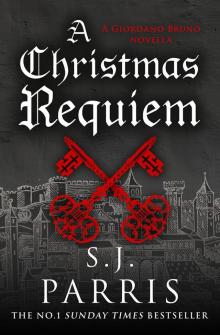 A Christmas Requiem
A Christmas Requiem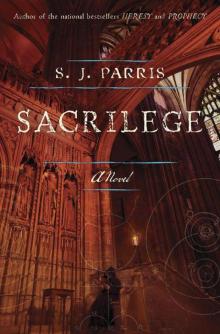 Giordano Bruno 03 - Sacrilege
Giordano Bruno 03 - Sacrilege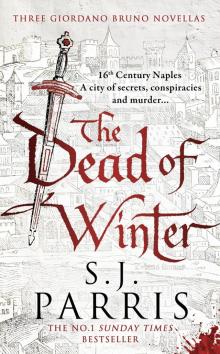 The Dead of Winter: Three gripping Tudor historical crime thriller novellas from a No. 1 Sunday Times bestselling fiction author
The Dead of Winter: Three gripping Tudor historical crime thriller novellas from a No. 1 Sunday Times bestselling fiction author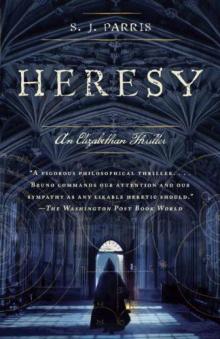 Giordano Bruno 01 - Heresy
Giordano Bruno 01 - Heresy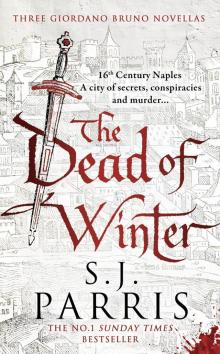 The Dead of Winter
The Dead of Winter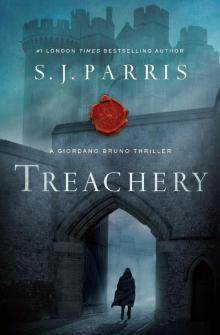 Treachery (2019 Edition)
Treachery (2019 Edition)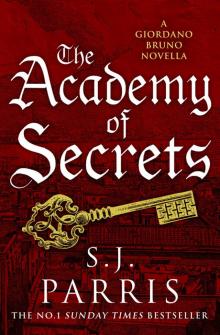 The Academy of Secrets
The Academy of Secrets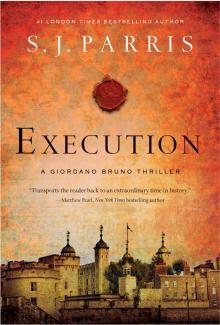 Execution
Execution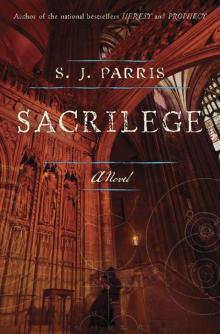 Sacrilege: A Novel
Sacrilege: A Novel Prophecy
Prophecy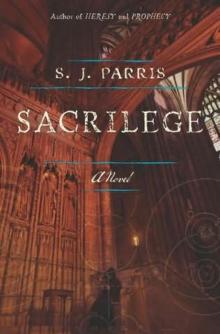 Sacrilege gb-3
Sacrilege gb-3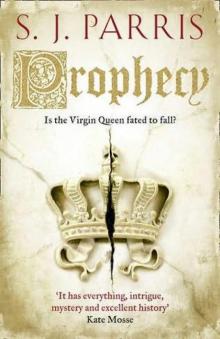 Prophecy (2011)
Prophecy (2011)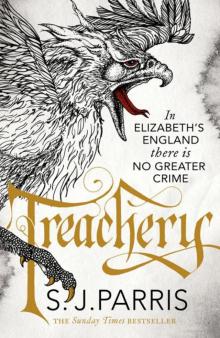 Treachery
Treachery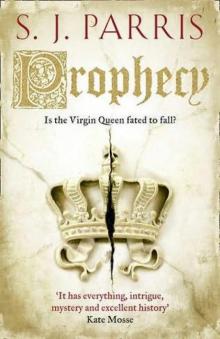 Prophecy gb-2
Prophecy gb-2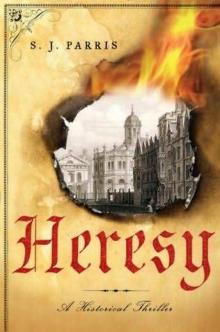 Heresy
Heresy